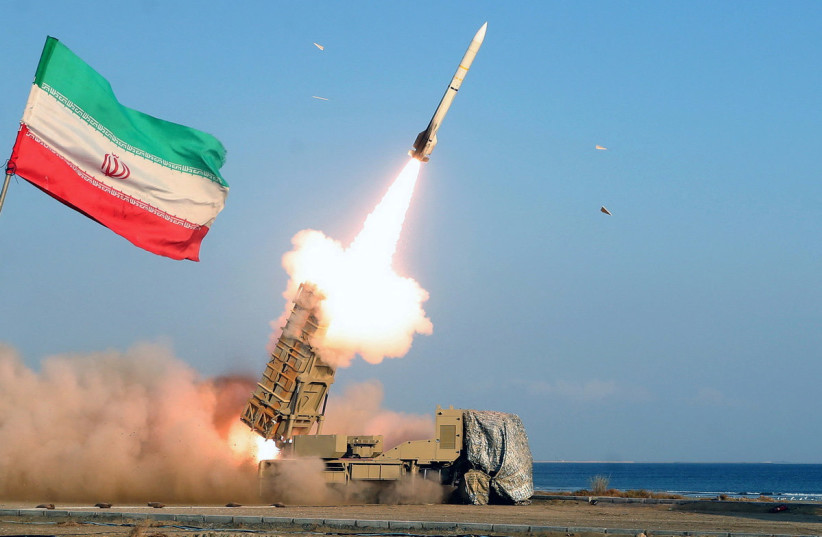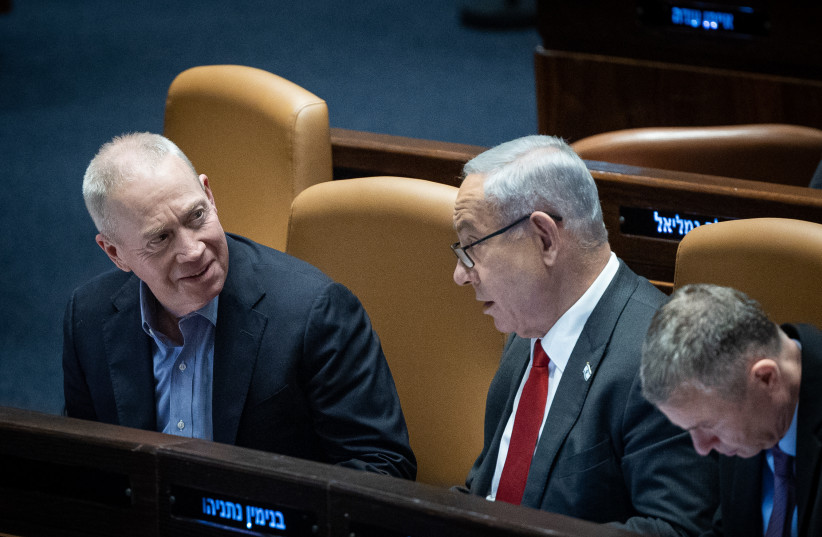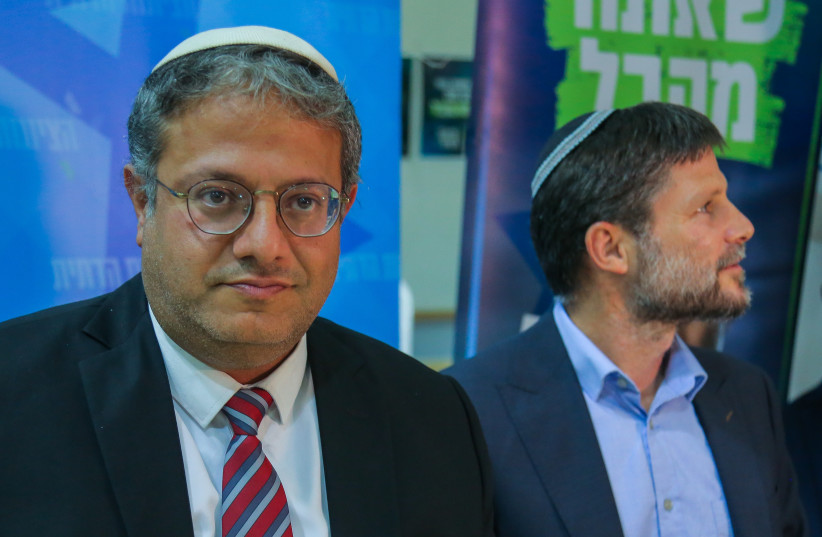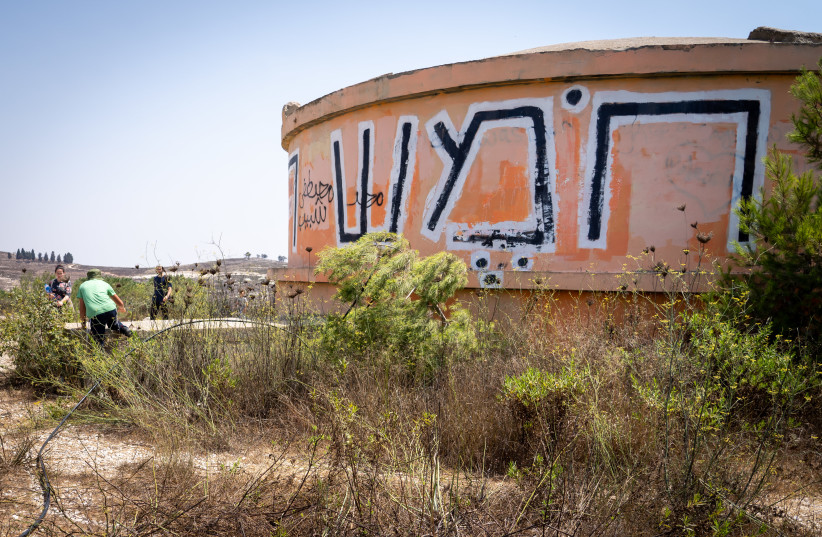Defense Minister Yoav Gallant often looks grim. It’s not because he does not like to smile – he has a wide smile for the right moments, like when he was mobbed by senior defense officials at his swearing-in.
It’s because of the intense weight he carries on his shoulders.
He frequently talks about being the son of Holocaust survivors, and views Iran as his primary security problem as part of his personal mission to keep Israel secure.
The following areas are what he has been focusing on, for much of his time.
Iran
The Jerusalem Post has learned that regarding Iran, Gallant views the Islamic Republic as a threat on two main thrusts.

He sees a war of attrition against Israel via Lebanon, Syria and Gaza, and also within Israel itself.
The other, is Tehran’s nuclear ambitions, which Gallant would say are an existential issue for Israel and a basis for Iran to increase its promotion of global terrorism.
In fact, the defense minister views Iran as a generator of terrorism not just against Israel, but against the Sunni Gulf states too, and in many different corners of the planet during various time periods.
To resist them, Gallant’s belief is that there are only two options – a military attack, or convincing Tehran that a such an attack will happen if it crosses certain lines, which in effect deters it from crossing those lines.
The Post has learned that Gallant thinks Israel is close to the time where it will have no choice but to act (he has said so publicly, but he really means it).
Israel has high levels of coordination with the US on the issue, and his hope would be that any major action would be in partnership with the US and possibly with aspects from Sunni Arab allies. But the defense minister also has said Israel is ready to act with tremendous force if it has to act alone.
Another way to view this is that all the billions dollars being spent on preparing to face Iran is not a bluff, or for nothing.
Like many top officials, Gallant does not want to go on record about what time period or red line Iran would need to cross to cause Israel to act. Rather, when confronted by views arguing for slightly more restraint, like those of former Mossad chief Tamir Pardo, or former IDF chief Gabi Ashkenazi, versus those advocating a more aggressive approach, like former Mossad chief Yossi Cohen and likely former IDF chief Aviv Kohavi, he would say that all prior views are theoretical, since he is the one who will have to make the fateful decision.
Every week, Gallant spends many hours on the issue with IDF Chief of Staff Lt-Gen. Herzi Halevi and Prime Minister Benjamin Netanyahu.
At least once every week to three weeks, he holds a meeting with the heads of the Mossad and the Shin Bet (Israel Security Agency).
Gallant recognizes that the Russian invasion of Ukraine and Iran’s military aid to Russia have opened major opportunities for Israel on Iran among European Union countries. It has brought them round to viewing the Islamic Republic as having dangerous motives and intentions.
At a recent conference in Munich, around a dozen defense ministers conveyed to Gallant that they view Iran as a deadly country.

IDF reservist crisis
Those who have spent years working with Gallant would say that he wakes up every day with the attitude of a graduate of the Shayetet 13 naval commando unit who went on to command ground forces in Jenin, and served as the prime minister’s military attache and as OC Southern Command. His life has been shaped by the IDF’s values and national security considerations.
On March 23, Gallant made a speech asking the government to delay the judicial overhaul to leave more time for dialogue. This prompted Netanyahu to fire him, a move that the prime minister later reversed.
When Gallant made the speech, all the heads of the IDF, Shin Bet, past IDF chiefs and defense ministers presented him with intelligence and opinions that Israel’s enemies saw Israel as falling apart because of the huge protests and threats not to serve in the IDF. This appeared to display fragility to Israel’s enemies.
Gallant had presented this around 10 times to the prime minister and tried many ways to “correct” the path of the judicial overhaul “train” before the speech but ultimately, he could delay no longer. He feels he did what no other politician in Israel did – put his political future on the line while preferring to protect the defense establishment.
The Post has learned that Gallant viewed the crisis as not only affecting the IDF’s reserves, but that it also trickled down through the ranks among conscripts and career soldiers.
He told his family that it appeared as if his days as defense minister were over.
Gallant certainly supports some form of judicial reform that would alter the balance of the separation of powers and circumscribe some of the powers of the legal establishment but he believes that the process must happen gradually, with plenty of time for dialogue and reaching a broader national consensus.

Survival as defense minister
Gallant would note that despite his announced dismissal and a subsequent statement that his firing would still stand, but would be paused, the prime minister eventually held a press conference where effectively buried the issue.
Behind the scenes, officials watching Gallant and Netanyahu interacting in more confined settings said that their relations have returned to a high level of trust, and it is clear that in serious cabinet debates that Netanyahu affords much weight to the advice he receives from his defense minister.
No one is denying that there was a major crisis. But after the fact, Gallant believes that the prime minister now understands the dilemma he was facing at the time – real concern and not because of disloyalty or a desire to undermine the prime minister.
Confronted with the many past defense ministers Netanyahu has fired, he would acknowledge that many things can happen in the unpredictable world of politics, but would say the current coalition is back to functioning effectively.
Addressing critics of his actions within the coalition who slammed the IDF for not cracking down more on protesting reservists, he would say that none of them did reserve duty in Jenin, Tunis, Sudan, Syria, Libya or risked their lives in all the dangerous places he has been to.
Going forward, Gallant would say he has worked hard to maintain strong morale within the IDF and all of the security forces, and that the positive results were seen during Operation Shield and Arrow in Gaza.
His view is that the next round of criticism from IDF reservists of whatever comes out of the judicial overhaul negotiations will be reduced.
Gallant would say that everyone understands that the original, more extreme proposals must be replaced with more modest, consensus reform proposals, but also that the government will not surrender on the issue to those who are using protests to try to overthrow the government’s success in the last elections.
The Post has learned that the defense minister thinks there will be a compromise, but has been unimpressed with many of National Unity Party leader Benny Gantz’s actions. He believes Gantz could have joined a national-unity government – as Menachem Begin did in 1967 – to address the many crises the country is facing and to make the coalition itself more moderate.
Gallant would say that when Gantz says “Israel comes first,” he thinks his party has been insincere and that all it wants to do is to topple the government.

Smotrich, Ben-Gvir and the US
Gallant did not get to arrange the makeup of the coalition or the deals that were signed. He recognizes that there are 14 lawmakers between the two loosely affiliated parties of National Security Minister Itamar Ben-Gvir and Finance Minister (with some Defense Ministry authorities) Bezalel Smotrich. But he sees the two political rivals, both whom have repeatedly attacked him in the media, very differently.
On the one hand, Gallant would say that Smotrich is very contrarian. This forces Gallant to be the “responsible grownup,” which is an asset for the prime minister to deal with “Smotrich problems.”
Wearing this hat, Gallant may sometimes also be used by Netanyahu to deflect criticism from policies that the prime minister himself quietly also supports. Gallant seems ready to buy into this role fully, despite its potential political pitfalls.
Gallant would say that the coalition deal was very problematic because it promised Smotrich full control over the West Bank Civil Administration. This would have caused contradictions in the IDF’s chain of command and also caused international law problems, since the IDF central commander is supposed to be responsible for the “belligerent occupation” (a legal, not a political term) of Judea and Samaria.
After extensive negotiations with Smotrich’s team, the sides agreed that: 1) any military force in the West Bank would only filter through the IDF chief; 2) regarding civil issues, Gallant can intervene at any time if a national security issue is at stake, and all actions by
Smotrich’s staff in that respect must be reported in real time to Gallant’s staff.
The defense minister thinks that Smotrich is sophisticated and that he knows he must work within certain “rules of the game,” whereas Ben-Gvir is just a pure populist who leaks private conversations to the media and seems to be talking to the press even in one-on-one meetings (as if he is wearing a wire). Gallant now tries to avoid one-on-one conversations with him.
Ideologically, Gallant knows he is different from both of them, whether regarding politics or humanitarian issues. They both want to topple the Palestinian Authority, while Gallant believes it is crucial to preserve the PA. Gallant wants to advance the settlement enterprise in the West Bank 100% ideologically, but between that and practical questions considering the impact on the real world, especially with the US, can be a long distance.
Ultimately, though Smotrich said he would decide and control everything in Judea and Samaria, Gallant believes this is disconnected from the reality of how things came out. His view would be that Smotrich has no real standing in the Defense Ministry, and Ben-Gvir’s prized private “forces” are just talk.
The defense minister also believes he is an asset for Netanyahu with top US officials.

Homesh crisis
What if the US, the EU and other critics were to try to say Gallant lost his “responsible adult” title when he endorsed the rebuilding of the Homesh Yeshiva in the West Bank earlier this week? First, neither US Secretary of Defense Lloyd Austin nor any other senior US officials have complained to Gallant to date, despite public criticism of the government as a whole from the US State Department spokesman.
Also, Gallant can respond that centrist National Unity Party leader Benny Gantz, back when he was still defense minister, endorsed a legal strategy for doing exactly what Gallant is doing now, and that Gallant’s strategy is even less problematic legally. If restoring certain settlements and outposts even on private Palestinian land was good enough for Gantz, then Gallant would say that by moving the yeshiva to state land, his actions are even more in line with international law then were Gantz’s.
Most strikingly, Gallant is not remotely worried that the Homesh incident will affect his strong relations with Austin, US military chief Gen. Mark Milley, CENTCOM chief Gen. Michael Kurilla or US National Security Advisor Jake Sullivan.
DURING RAMADAN, there were extensive defense establishment debates led by Gallant about how to continue to fight terrorism, but to do it in a smart and focused way that would not inflame the situation. The same approach was applied to the May 9-13 Gaza conflict, where Hamas and much of Gaza were carefully left unharmed as the IDF focused its wrath on Islamic Jihad.
Gallant is also focused on improving the Palestinian’s economic situation to improve overall stability, as well as planning for “the day after” elderly PA President Mahmoud Abbas dies, when the situation will be fluid and could change significantly.
The defense minister would say that two-thirds of Israel’s 75 years have seen worse terrorism periods than the current time. While he views the IDF’s proactive nightly efforts against terrorism as important, he does not feel that the ongoing waves, at their current level, threaten his or the government’s stability.
Only time will tell whether Gallant can continue to walk the tightrope in the face of the possible crises ahead. •
